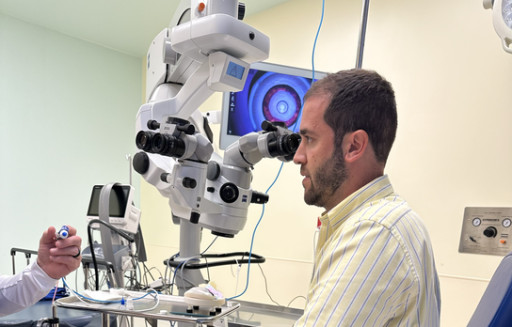Featured
Healthy and balanced vision is a keystone of lifestyle, yet many individuals underestimate the importance of nourishment in keeping eye health. A diet regimen rich in certain nutrients can protect your eyes, reduce the risk of developing usual eye diseases, and assistance overall eye function. Allow's explore exactly how nourishment effects your eyesight and the key nutrients you must include in your day-to-day meals.
Vital Nutrients for Eye Health And Wellness
Vitamin A. Recognized for its role in protecting vision, vitamin A is essential for preserving a healthy cornea and making it possible for low-light vision. Shortage in vitamin A can bring about night blindness and various other significant eye problems. Outstanding sources consist of carrots, wonderful potatoes, and dark leafy greens.
Lutein and Zeaxanthin. Found in high concentrations in the retina, these anti-oxidants safeguard against damages brought on by blue light and oxidative anxiety. Consuming foods like spinach, kale, broccoli, and eggs can aid keep your eyes healthy and balanced.
Omega-3 Fat. Omega-3s are crucial for the wellness of the retina and can help minimize symptoms of dry eye disorder. Include fatty fish such as salmon, tuna, and mackerel in your diet plan, or go with plant-based resources like chia seeds and walnuts.
Vitamin C. A powerful anti-oxidant, vitamin C supports the health of capillary in the eyes and might lower the threat of cataracts. Foods rich in vitamin C consist of oranges, strawberries, bell peppers, and tomatoes.
Vitamin E. This nutrient safeguards eye cells from oxidative damages. Integrate almonds, sunflower seeds, and avocados right into your meals to improve vitamin E levels.
Zinc. Zinc plays a key function in carrying vitamin A from the liver to the retina, aiding in the manufacturing of melanin, a protective pigment in the eyes. Foods such as oysters, beef, and fortified grains are superb resources.
![]()
Preventing Eye Issues Via Diet
Macular Deterioration: Antioxidants like lutein, zeaxanthin, and vitamins C and E can help slow down the development of age-related macular degeneration (AMD)
Cataracts: Ample intake of vitamin C and various other antioxidants might postpone the start or avoid of cataracts.
![]()
Dry Eyes: Omega-3 fats help improve tear high quality and relieve completely dry eye signs and symptoms.
Diabetic Retinopathy: A diet low in polished sugars and rich in entire foods can assist manage blood sugar levels, minimizing the danger of this condition in people with diabetic issues.
Practical Nourishment Tips
Expand Your Diet Plan: Consist of a selection of fruits, vegetables, lean healthy proteins, and entire grains to guarantee you're obtaining a vast array of nutrients.
Restriction Processed Foods: Reduce consumption of added sugars and harmful fats, which can add to systemic health and wellness problems impacting your eyes.
Stay Hydrated: Appropriate hydration sustains tear production and avoids eye dryness.
Consider Supplements: If your diet does not have certain nutrients, consult a doctor concerning taking supplements for much better eye health.
Final Thought
![]()
Great nourishment is a necessary element of keeping ideal eye health. By incorporating nutrient-dense foods right into your diet plan, you can lower the risk of eye conditions and safeguard your vision for the long term. Making notified dietary options today can protect your sight for several years to come. A consultation with a nutritional expert or health care professional can give personalized advice tailored to your demands. if you're unclear where to start.
Vital Nutrients for Eye Health And Wellness
Vitamin A. Recognized for its role in protecting vision, vitamin A is essential for preserving a healthy cornea and making it possible for low-light vision. Shortage in vitamin A can bring about night blindness and various other significant eye problems. Outstanding sources consist of carrots, wonderful potatoes, and dark leafy greens.
Lutein and Zeaxanthin. Found in high concentrations in the retina, these anti-oxidants safeguard against damages brought on by blue light and oxidative anxiety. Consuming foods like spinach, kale, broccoli, and eggs can aid keep your eyes healthy and balanced.
Omega-3 Fat. Omega-3s are crucial for the wellness of the retina and can help minimize symptoms of dry eye disorder. Include fatty fish such as salmon, tuna, and mackerel in your diet plan, or go with plant-based resources like chia seeds and walnuts.
Vitamin C. A powerful anti-oxidant, vitamin C supports the health of capillary in the eyes and might lower the threat of cataracts. Foods rich in vitamin C consist of oranges, strawberries, bell peppers, and tomatoes.
Vitamin E. This nutrient safeguards eye cells from oxidative damages. Integrate almonds, sunflower seeds, and avocados right into your meals to improve vitamin E levels.
Zinc. Zinc plays a key function in carrying vitamin A from the liver to the retina, aiding in the manufacturing of melanin, a protective pigment in the eyes. Foods such as oysters, beef, and fortified grains are superb resources.

Preventing Eye Issues Via Diet
Macular Deterioration: Antioxidants like lutein, zeaxanthin, and vitamins C and E can help slow down the development of age-related macular degeneration (AMD)
Cataracts: Ample intake of vitamin C and various other antioxidants might postpone the start or avoid of cataracts.

Dry Eyes: Omega-3 fats help improve tear high quality and relieve completely dry eye signs and symptoms.
Diabetic Retinopathy: A diet low in polished sugars and rich in entire foods can assist manage blood sugar levels, minimizing the danger of this condition in people with diabetic issues.
Practical Nourishment Tips
Expand Your Diet Plan: Consist of a selection of fruits, vegetables, lean healthy proteins, and entire grains to guarantee you're obtaining a vast array of nutrients.
Restriction Processed Foods: Reduce consumption of added sugars and harmful fats, which can add to systemic health and wellness problems impacting your eyes.
Stay Hydrated: Appropriate hydration sustains tear production and avoids eye dryness.
Consider Supplements: If your diet does not have certain nutrients, consult a doctor concerning taking supplements for much better eye health.
Final Thought

Great nourishment is a necessary element of keeping ideal eye health. By incorporating nutrient-dense foods right into your diet plan, you can lower the risk of eye conditions and safeguard your vision for the long term. Making notified dietary options today can protect your sight for several years to come. A consultation with a nutritional expert or health care professional can give personalized advice tailored to your demands. if you're unclear where to start.
Latest Posts
Uncover the Top Auto Repair Discounts in Montclare, Chicago
Published May 27, 25
1 min read
Take Advantage of Exclusive Auto Repair Deals in Chicago at Montclare Auto Repair
Published May 25, 25
1 min read
Find Montclare Auto Repair’s Highly Requested Auto Repairs and Why Drivers Rely On Them
Published May 23, 25
1 min read
More
Latest Posts
Uncover the Top Auto Repair Discounts in Montclare, Chicago
Published May 27, 25
1 min read
Take Advantage of Exclusive Auto Repair Deals in Chicago at Montclare Auto Repair
Published May 25, 25
1 min read
Find Montclare Auto Repair’s Highly Requested Auto Repairs and Why Drivers Rely On Them
Published May 23, 25
1 min read